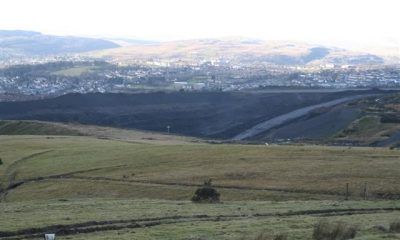News
Sea Empress oil spill: 25 years since Wales’ biggest ecological disaster
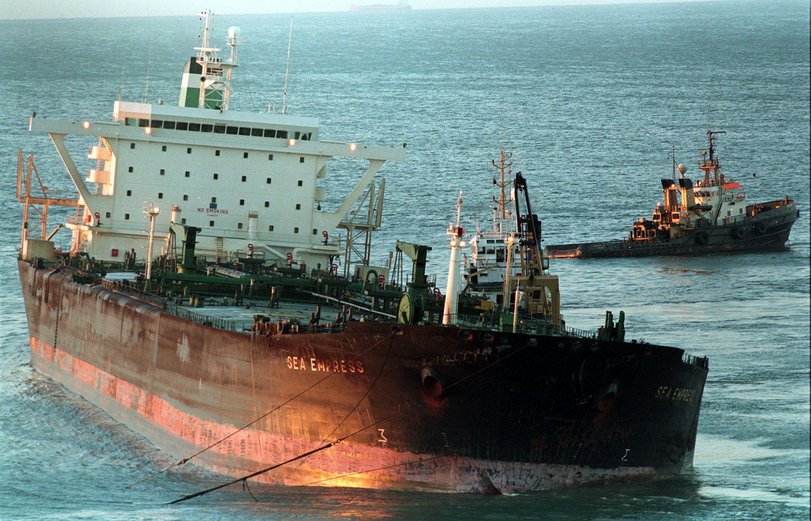
IT’S EXACTLY 25 years since Wales’ worst ecological disaster – single hull oil tanker hit rocks in the middle of the channel, holing her below the waterline.
On 15 February 1996, the Sea Empress oil tanker ran aground as it entered the Milford Haven Waterway.
Six days later, the tanker re-floated and was towed into the harbour. In the days between its grounding and towing, the oil tanker spilled 72,000 tons of crude oil along the Pembrokeshire Coastline, within the Pembrokeshire Coast National Park.
It was a Thursday morning the oil tanker was en route to the Texaco oil refinery when she became grounded on mid-channel rocks at St. Ann’s Head. Over the course of a week, she spilt 72,000 tons of crude oil into the sea. The spill occurred within the Pembrokeshire Coast National Park – one of Europe’s most important and sensitive wildlife and marine conservation areas.
Sailing against the outgoing tide and in calm conditions, at 20:07 GMT the ship was pushed off course by the current and became grounded after hitting rocks in the middle of the channel.
The collision punctured her starboard hull causing oil to pour out into the sea. Tugs from Milford Haven Port Authority were sent to the scene and attempted to pull the vessel free and re-float her. During the initial rescue attempts, she detached several times from the tugs and grounded repeatedly – each time slicing open new sections of her hull and releasing more oil.
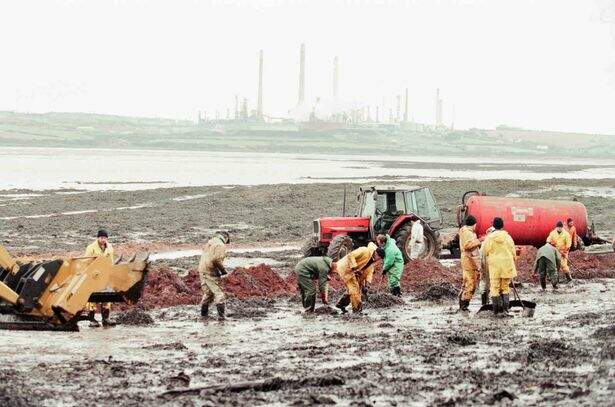
Clean up underway near Dale, Pembrokeshire following the oil spill (Image PA)
RESCUE OPERATION
A full scale emergency plan was activated by the authorities. News of the grounding was first reported at 21:18 on the BBC’s Nine O’Clock News – just over an hour after she ran aground.
Over the next few days, efforts to pull the vessel from the rocks continued.
Assisting the many local vessels, tugboats were drafted in from the ports of Dublin, Liverpool and Plymouth to assist with the salvage operation.
The tanker ran aground very close to the islands of Skomer and Skokholm – both national nature reserves, Sites of Special Scientific Interest (SSSI) and Special Protection Areas and home to Manx shearwaters, Atlantic puffins, guillemots, razorbills, great cormorants, kittiwakes, European storm-petrels, common shags and Eurasian oystercatchers.
Birds at sea were hit hard during the early weeks of the spill, resulting in thousands of deaths. The Pembrokeshire grey seal population didn’t appear to be affected too much and impacts to subtidal wildlife were limited. However, much damage was caused to shorelines affected by bulk oil. Shore seaweeds and invertebrates were killed in large quantities. Mass strandings of cockles and other shellfish occurred on sandy beaches. Rock pool fish were also affected. However, a range of tough shore species were seen to survive exposure to bulk oil and lingering residues.
A rescue centre for oiled birds was set up in Milford Haven. According to the Countryside Council for Wales (CCW), over 70% of released guillemots died within 14 days. Just 3% survived two months and only 1% survived a year.
The Pembrokeshire coast is home to common porpoises and bottlenose dolphins.
The effects of the oil and chemical pollution on these species remains unknown. Significant numbers of both species were recorded in the waters off the Skomer Marine Nature Reserve during the spring and summer of 1996.
The main containment and dispersement of the oil slick at sea was completed within six weeks. However, the removal of oil on shore took over a year until the late spring of 1997. Small amounts of oil were still found beneath the sand on sheltered beaches and in rock pools in 1999 – three years after the spill.
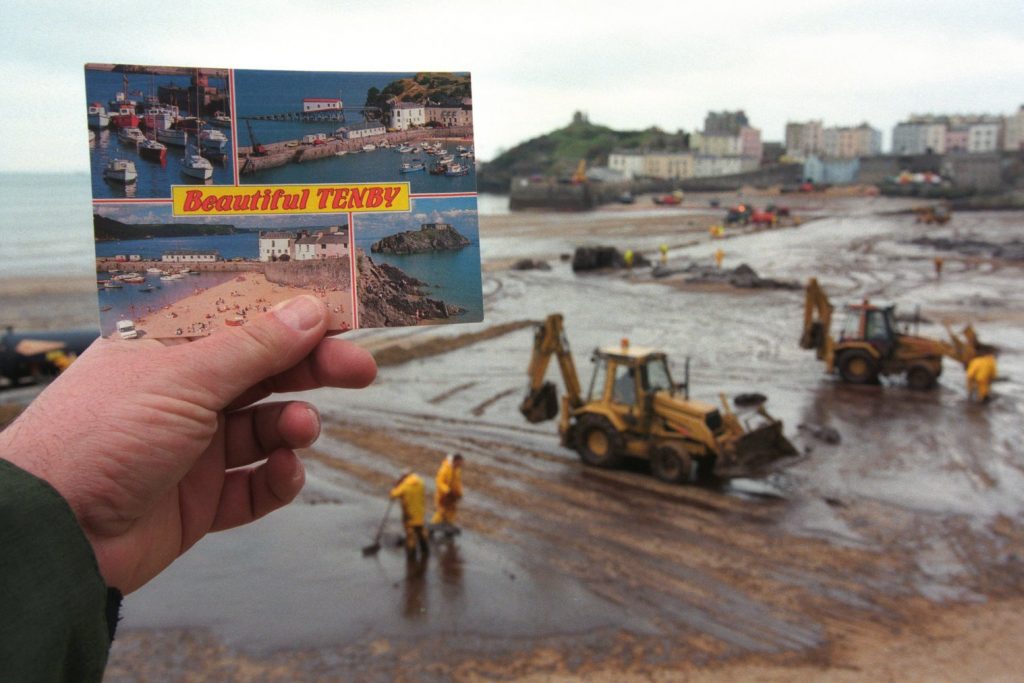
Contractors clean oil from Tenby north beach after the oil tanker Sea Empress ran aground on rocks Pembrokeshire Wales UK (Image: PA)
IT COULD HAVE BEEN WORSE
The effects of the spill were not as bad as initially predicted. This was due in part to the time of year when the spill occurred.
In February, many migratory animals had not yet arrived back in Pembrokeshire for breeding.
Along with stormy weather which helped break-up and naturally disperse the oil, the effect on wildlife would have been much worse if the spill had occurred just a month later.
The spill would undoubtedly have been catastrophic for both the environment and local economy if it had occurred during the summer months.
Much of the Pembrokeshire coastline recovered relatively quickly.
By 2001, the affected marine wildlife population levels had more-or-less returned to normal.
There was an immediate ban on fishing off the coast of Pembrokeshire and south Carmarthenshire which had a devastating impact on the local fishing industry.
The ban remained in place for several months and was lifted in stages.
Many local fishermen received financial compensation for the loss of income due to the ban.
The spill occurred just a few weeks before the Easter break when many holidaymakers would be visiting the area.
Some sheltered beaches and tidal estuaries were still covered with oil, but the main tourist locations of Tenby, Saundersfoot, Pendine, Manorbier and Bosherston were superficially cleaned.
A large clean-up operation began as soon as the Sea Empress started spilling oil.
Volunteers and paid hands alike, came together to restore the beautiful beaches of Pembrokeshire.
In the immediate days and weeks that followed, one thousand people worked around the clock to rescue oiled birds and remove oil from beaches using suction tankers, pressure washers and oil-absorbing scrubbers.
The main clean-up operation lasted several weeks and continued on a reduced scale for over a year.
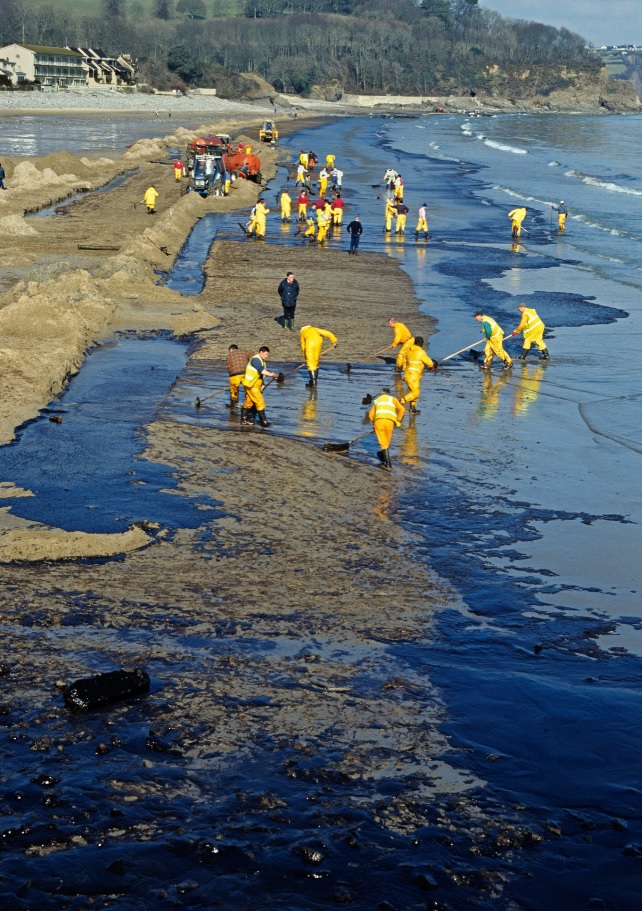
Workmen clean up the spill in Tenby (Image PA)
PORT AUTHORITY FINED £4 MILLION
Almost three years after the spill in January 1999, Milford Haven Port Authority (MHPA) was fined a record £4m after pleading guilty to the offence of causing pollution under the Water Resources Act 1991. The MHPA was also required to pay a further £825,000 prosecution costs by agreement.
The cost of the clean-up operation was estimated to be £60m. When the effects to the economy and environment are taken into account, the final cost is estimated to have been twice that, at £120m.
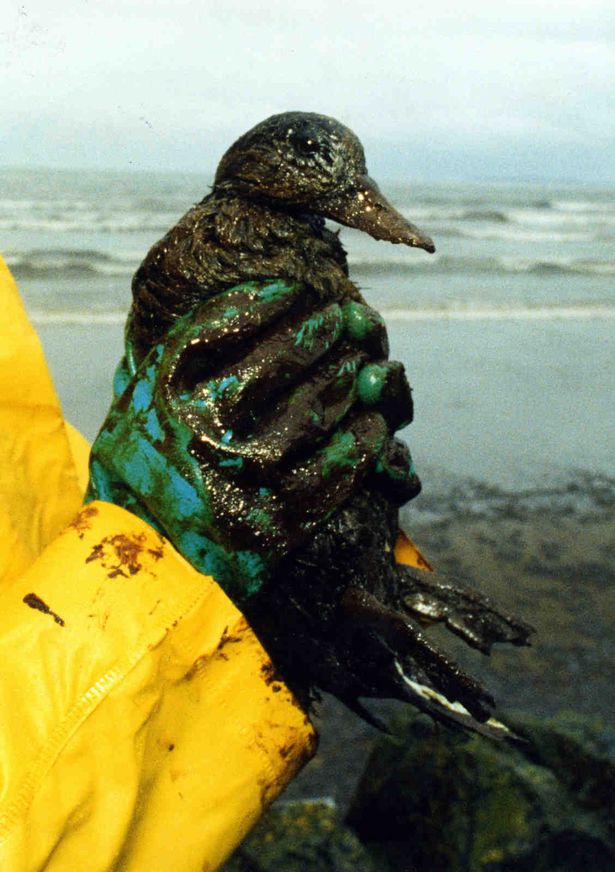
Oiled seabird rescued for cleaning (Image: File)
SHIPS BAD LUCK CONTINUES
While the cause of the initial grounding was found to be due to pilot error, it seems the vessel, even under new ownership, could not escape her run of bad luck. While attempting to dock for scrapping in Bangladesh she was ruptured again, this time by a sunken vessel.
She was renamed a further four times before her final demise, known as MV Front Spirit for a while before being sold under the name MV Ocean Opal, to Chinese buyers.
They used her as a floating storage and offloading unit from 2004. In 2010, she was converted in Shanghai into a bulk carrier, and re-flagged as the Panamanian registered MV Welwind. In 2012, she was renamed for a fifth time: MV Wind 3 and on June 3 that year the 274-metre long vessel was brought to Chittagong in Bangladesh for dismantling at the Shitakunda ship breaking yard.
On the way to the yard the ship developed a crack in one side of its engine room following a collision with a sunken ship, Hang Ro Bong, when she was attempting to anchor at the B (Bravo) anchorage of the port.
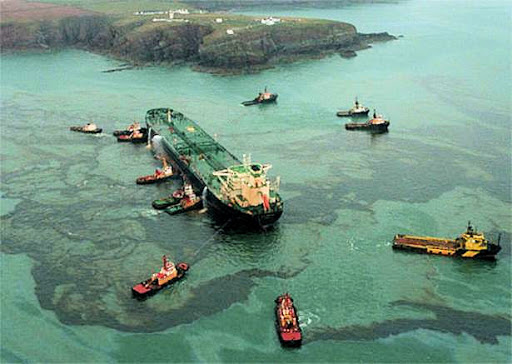
The view from above: The scale of the operation unfolds (Image: Herald archive/MCA)
LESSONS NOT LEARNED
In 2016 former local MP Nick Ainger said that the lessons from the disaster had not been learned
He told BBC Radio Wales’ Sunday Supplement programme that the scrapping of the UK’s emergency towing vessel fleet showed lessons had not been learned 20 years on- The Maritime and Coastguard Agency (MCA) said it was felt the shipping industry should fund such a service.
Mr Ainger said: “We now have a position, 20 years after the Sea Empress, 23 after the Braer, where we have no emergency towing vehicles stationed around our coast.
“Ironically, other countries in Europe, in Spain, in France, Germany, Norway have got government-financed emergency towing vessels.
“We, with our huge coastline with all the shipping that we have coming not only in and out of Milford Haven, but around our shores from the North Sea carrying crude oil, we haven’t got a government-supported emergency towing vessel.
“I think that lesson should be re-learned very, very quickly before we have another disaster.”
An MCA spokeswoman said: “The government believes that responsibility for ensuring the operational safety of ships is properly a matter for the commercial shipping industry, working in partnership with the tug and salvage industries; it did not believe that it was appropriate for the taxpayer to fund this provision.”
She added that no vessel had run aground or foundered in UK waters, nor had any pollution occurred, as a result of a ship being unable to engage a suitable towing vessel.
Following the Sea Empress disaster towing regulations in the Milford Haven waterway were tightened. Following the lead from a Scottish oil terminal, Sullom Voe, ‘escort towing’ was started. Cory Towage sent a representative to Shetland to observe and report back.
At the time the Sea Empress went aground this practice had already started in the Solent for the Port of Southampton, If Milford Haven had done the same in time, the disaster would certainly not have occurred.
Further reading: The Sea Empress’s second accident
Community
Castle tearoom serves up new sensory-friendly sessions

NEW sensory-friendly sessions at a popular castle tearoom will enable visitors with additional needs to enjoy a welcoming and accommodating environment tailored to their specific requirements.
As part of an initiative to boost engagement with a more diverse audience, Carew Castle, which is run by the Pembrokeshire Coast National Park Authority, will be running a new Quiet Hour and Power Hour at Nest Tearoom on the second Monday of each month.
The Quiet Hour, designed to provide a safe space for anyone who feels anxious or overwhelmed when out in public, will take place between 9am and 10am, before the Castle opens. Bright lighting and noise will be kept to a minimum and visitors will be able to enjoy quieter activities in a relaxing environment.
The Power Hour is scheduled for 4.30pm to 5.30pm and offers an energetic and engaging session, tailored to promote physical movement and social engagement. The aim is to create an opportunity for individuals who thrive in more active settings to connect with others, without concern for excessive noise or social interaction.
Manager of Carew Castle, Daisy Hughes, said: “We are thrilled to introduce these new sensory-friendly sessions at Carew Castle, as part of our ongoing commitment to accessibility and inclusivity.
“The Quiet Hour and Power Hour sessions aim to cater to the specific needs of our visitors, providing them with an environment where they can truly be themselves. As well as being able to use the café facilities, visitors will be able to explore the Castle garden. For those who wish to explore the Castle, entry is free with a Carers Card. Otherwise, normal entry fees apply.”
The Castle, which was named Pembrokeshire Visitor Attraction of the Year in last year’s Croeso Awards isn’t the only Park Authority-run site to adapt the visitor experience to accommodate more diverse audiences. A Sunday morning Quiet Hour was introduced at Castell Henllys Iron Age Village in 2019 to encourage people who would not otherwise have visited the site to come along and discover more about the lives of their ancient ancestors.
To learn more about the sensory-friendly sessions and to plan your visit, please contact Carew Castle directly on 01646 651782 or visit www.carewcastle.com. Further information about Castell Henllys’ Quiet Hour can be found at www.pembrokeshirecoast.wales/castell-henllys/about-castell-henllys/accessibility-2/.
Community
Four-day community engagement at Haverfordwest Castle Square
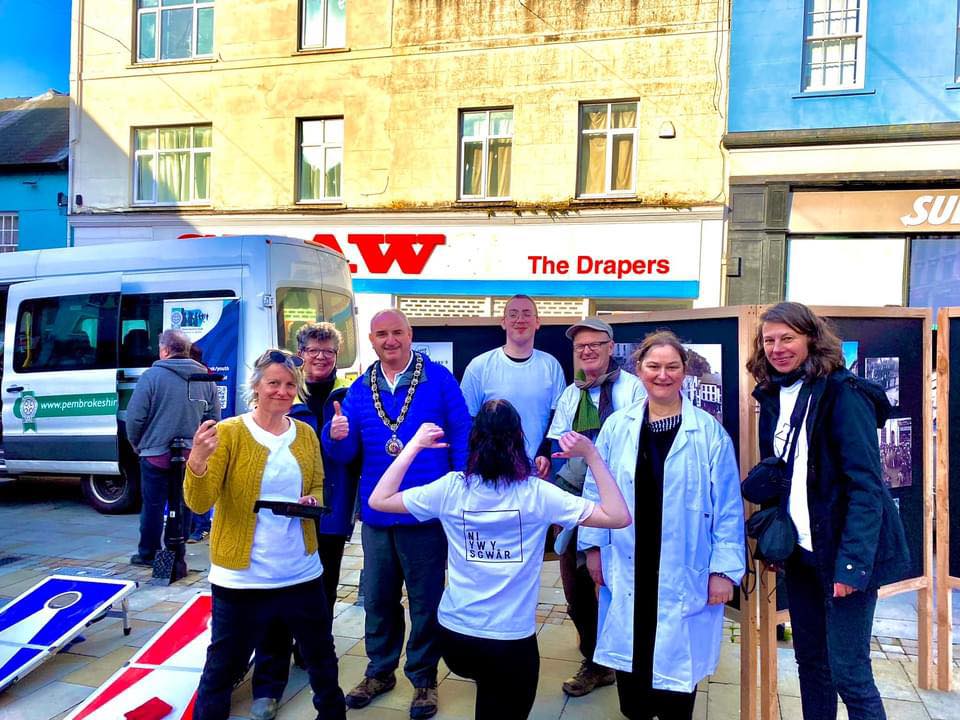
THOMAS Baden Tudor, Chairman of Pembrokeshire County Council and local councillor for Castle Ward, says he was delighted to participate in the opening of the “Sharing The Square” event. The four-day programme, running from April 24 to 27 at Haverfordwest Castle Square, invites the community to exchange memories and ideas for the future development of this historic area.
The initiative, in collaboration with local artists and Pembrokeshire County Council, aims to collect community input on potential improvements and address existing challenges in the square. The event also seeks to enhance the connectivity with the adjacent Haverfordwest Castle, focusing on pedestrian routes from the square to the castle.
A variety of public activities are scheduled to take place during the event. These include gardening, creative workshops, games, and musical performances, ensuring an engaging experience for all attendees. Among the highlights is an art workshop led by renowned artist Janetka Platun. Her session titled “What is Lost and What is Found?” offers participants of all ages and abilities the chance to develop model-making skills. Each attendee will create a small model housed in an acrylic box, using diverse and intriguing materials.
Local community groups have been invited to reserve a slot for this free workshop, which is available on the afternoons of 24th, 25th, and the morning and afternoon of 27th April. The project aims to provide a platform for residents to reflect on their personal connections to the square and envision its future.
Further details on the ongoing and future activities can be found on the project’s official website at www.sharingthesquare.org, and updates are regularly posted on their Instagram account @sharingthesquare.
The event has already attracted attention with various stakeholders, including Randell Izaiah Thomas-Turner, Danielle Thomas-Turner, and Guy Norman from Spacetocreate, contributing to the discussions and activities.
Photos from today’s activities can be viewed at The Edge Youth Centre’s social media, highlighting the community’s enthusiastic participation in shaping the future of Haverfordwest Castle Square.
Business
Steelworkers’ Union presses Tata to adopt expert plan ahead of talks

THE Steelworkers’ union, Community, is pressing Tata Steel UK to scrap its bad deal for steel and commit to the alternative Multi-Union Plan ahead of crucial talks with the company this week.
The call follows a meeting between steel unions and Tata officials last week, and the publication of a new report from industry experts Syndex which slams Tata’s approach for pursuing ‘what’s cheap’ over ‘what’s best’. The report highlights that the company’s current proposal – which would cut around 2,800 jobs in South Wales by moving production at Port Talbot to a single 3mt Electric Arc Furnace – comes with significant risks, and would make Tata Steel UK an outlier in Europe.
In contrast, Syndex describes the Multi-Union Plan as “the only solution offering to maintain all the volume currently produced by Tata Steel UK” providing “a future for all the company’s assets and a roadmap for a just transition under the constraint of the financial hurdles and the reality of market dynamics for the UK steel industry.”
Community General Secretary Roy Rickhuss said: “During our meeting with Tata last week, members of the National Trade Union Steel Coordinating Committee provided our final conclusions on the company’s restructuring proposals: namely that the company’s plan is reckless; that it weakens national security by removing Britain’s primary steelmaking capacity; and that it would have devastating consequences for steel communities in South Wales and beyond.
“Our Multi-Union Plan is a credible alternative to Tata’s destructive scheme. It would safeguard the future of Port Talbot steelmaking, protect all the downstream plants, save thousands of jobs and can be delivered with no compulsory redundancies.
“It is not too late for Tata to do the right thing and adopt the Multi-Union Plan – and we hope that they will take this step. However, should the company choose to reject it, we will fight them every step of the way. To enable us to do this, we will need the strongest possible mandate from our ongoing industrial action ballot. For that reason, I am urging all our members to vote ‘YES’ and ‘YES’ and return their ballot papers at the earliest opportunity.”
Community’s Assistant General Secretary Alasdair McDiarmid said: “Syndex’s new report demonstrates clearly that our Multi-Union Plan is viable and sustainable, whilst Tata’s proposals are reckless and harmful. The company must change course, and the UK Government need to step up too. Our alternative plan would require additional investment from the government – taking total public support for the decarbonisation of Port Talbot to £950m overall – but this is still significantly less than the support packages other governments are providing to green their steel industries. It’s also in line with the £3bn Green Steel Fund the Labour Party has guaranteed to deliver in the next parliament.
“We are at a critical moment, and the choices that Tata and the government make now will reverberate for generations to come. The fundamental question here is whether we want to be a country that makes its own steel, or a country that imports it – as would be inevitable under Tata’s damaging proposal. With the spectre of a CBAM exemption for India hanging over free trade talks, we risk under current plans becoming little more than a simple processor for imported Indian Steel. We can’t allow our industry to be sacrificed on the altar of Rishi Sunak’s search for a legacy.
“With so much at stake, we are urging our members to vote ‘YES and ‘YES’ in our industrial action ballot to enable us to fight to maintain blast furnace steelmaking into the 2030s and to prevent compulsory redundancies.”
Leading South Wales steel MPs have also thrown their support behind Community and the GMB’s Multi-Union Plan.
Stephen Kinnock, MP for Aberavon, said: “As industry experts at Syndex have laid out this week, the Multi-Union Plan is a detailed, serious, robust and compelling proposal for the future of the Port Talbot steelworks and it has my full and unequivocal support. It’s the only realistic route to retaining our customer base, and it’s also the only credible pathway to a strong, competitive and profitable future for steel-making in Port Talbot and throughout the downstream plants across Wales and the UK. By contrast Tata’s shortsighted and counter-productive plan will mean exporting jobs from Port Talbot to India, a country where steel plants have a far higher carbon footprint.
“It’s vital that steel is at the heart of a forward-looking industrial strategy, which is why Labour has pledged £3billion to support the industry over the next decade.”
Jessica Morden, MP for Newport East which includes Llanwern Steelworks, said: “Tata and Rishi Sunak’s bad deal for steel would represent a huge blow to our steel industry and steel communities like our own in Newport. The deal would also leave the UK country dependent on imported steel from heavy-polluting countries at a time of global uncertainty.
“It doesn’t have to be this way, and the Multi-Union Plan for steel which Community and GMB have put forward represents a viable alternative to protect jobs and preserve steelmaking capacity here in South Wales. I urge Tata to think again and change course from their damaging proposals.”
-

 News6 days ago
News6 days agoPolice issue update on the search for Luke, missing from Pembroke Dock
-

 News21 hours ago
News21 hours agoPolice and air ambulances at ‘serious incident’ at West Wales school
-

 Sport7 days ago
Sport7 days agoHerbrandston Clinch Promotion to Division One
-

 News5 days ago
News5 days ago20mph U-turn: Some roads will return to 30mph following public outcry
-

 Community5 days ago
Community5 days agoMiracle pup finds her forever home after heart-wrenching journey
-

 Community2 days ago
Community2 days agoCounty Hall to offer space for community banking
-

 Crime3 days ago
Crime3 days agoBrian Davis: Wanted on suspicion of commercial burglary
-

 Crime21 hours ago
Crime21 hours agoPembrokeshire pensioner accused of 17 sexual offences against children









